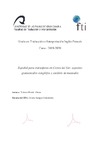Please use this identifier to cite or link to this item:
https://accedacris.ulpgc.es/jspui/handle/10553/74776
| DC Field | Value | Language |
|---|---|---|
| dc.contributor.advisor | Samper Hernández, Marta | es |
| dc.contributor.author | Martín Abreu, Tatiana | es |
| dc.date.accessioned | 2020-10-15T13:19:42Z | - |
| dc.date.available | 2020-10-15T13:19:42Z | - |
| dc.date.issued | 2020 | - |
| dc.identifier.uri | https://accedacris.ulpgc.es/handle/10553/74776 | - |
| dc.description.abstract | La enseñanza del español en Corea del Sur ha estado presente desde 1948 y en los últimos años ha ido ganando fuerza. Los objetivos de nuestra investigación han sido estudiar las principales diferencias entre las gramáticas española y coreana, establecer en qué partes de la gramática española encuentran más dificultades los estudiantes coreanos de español como lengua extranjera y comprobar si los manuales utilizados de la Universidad Hankuk de Estudios Extranjeros abordan esas diferencias y dificultades de la manera adecuada. Para ello se realizó una encuesta online con una muestra de 24 aprendientes de español en dicha universidad y se analizaron los temas de Escritura Inteligente del Español y Gramática de Español de Nivel Intermedio que estudiaban el elemento gramatical que presentaba mayor dificultad para los estudiantes, según su propia opinión. Como resultado se obtuvo que el elemento gramatical que resulta más complejo para los estudiantes es el subjuntivo, por su complejidad y su inexistencia en coreano. Además, Escritura Inteligente del Español no se adapta correctamente al nivel al que va dirigido por sus escasas explicaciones y por el desfase de nivel entre las explicaciones y los ejercicios; mientras que Gramática de Español de Nivel Intermedio, con sus explicaciones específicas y su gran cantidad de ejercicios, se adapta mejor, aunque aún presenta aspectos que mejorar. Se concluye que la universidad debería modificar estos manuales para abordar las dificultades del idioma de manera más eficaz o utilizar manuales de editoriales de países hispanohablantes especializadas en el campo. | en_US |
| dc.description.abstract | Spanish teaching has been present in South Korea since 1948 and it has been gaining strength during the last few years. The objectives of this research have been to study the main differences between Spanish and Korean grammars, to establish in which parts of Spanish grammar Korean students of Spanish as a foreign language find more difficulties and to check if the textbooks used by Hankuk University of Foreign Studies address those differences and difficulties in an appropriate way. For this purpose, an online survey was carried out with a sample of 24 students who learned Spanish in this university and the units of the textbooks Intelligent Spanish Writing and Intermediate Spanish Grammar were analyzed, studying the grammatical element that presented the greatest difficulty for students, according to their own opinion. The result was that the most complex grammar element for the students was the subjunctive, because of its complexity and non-existence in Korean. In addition, Intelligent Spanish Writing did not adapt correctly to the level it addresses to because of its scarce explanations and exercises. Meanwhile, Intermediate Spanish Grammar, with its specific explanations and its great amount of exercises, adapts better, although it still presents some aspects to improve. It is concluded that the university should modify those books to address the language difficulties more effectively or use the textbooks from publishers of Spanish speaking countries specialized in the field. | en_US |
| dc.language | spa | en_US |
| dc.subject | 570113 Lingüística aplicada a la traducción e interpretación | en_US |
| dc.subject.other | Español como lengua extranjera | es |
| dc.subject.other | Corea del Sur | es |
| dc.subject.other | Gramática | es |
| dc.subject.other | Análisis de manuales, | es |
| dc.subject.other | Universidad Hankuk de Estudios Extranjeros | es |
| dc.subject.other | Spanish as a foreign language | es |
| dc.subject.other | South Korea | es |
| dc.subject.other | Grammar | es |
| dc.subject.other | Textbook’s analysis | es |
| dc.subject.other | Hankuk University of Foreign Studies. | es |
| dc.title | Español para extranjeros en Corea del Sur: aspectos gramaticales complejos y análisis de manuales | es |
| dc.type | info:eu-repo/semantics/bachelorThesis | en_US |
| dc.type | BachelorThesis | en_US |
| dc.contributor.departamento | Departamento de Filología Hispánica Clásica Y De Estudios Árabes Y Orientales | es |
| dc.contributor.facultad | Facultad de Traducción e Interpretación | en_US |
| dc.investigacion | Artes y Humanidades | en_US |
| dc.type2 | Trabajo final de grado | en_US |
| dc.identifier.matricula | TFT-60847 | es |
| dc.identifier.ulpgc | Sí | es |
| dc.contributor.titulacion | Grado en Traducción e Interpretación: Inglés-Francés | es |
| item.grantfulltext | restricted | - |
| item.fulltext | Con texto completo | - |
| crisitem.advisor.dept | GIR Sociolingüística, fonética acústica y lingüística aplicada a la enseñanza | - |
| crisitem.advisor.dept | Departamento de Filología Hispánica, Clásica y de Estudios Árabes y Orientales | - |
| Appears in Collections: | Trabajo final de grado | |
Page view(s) 1
749
checked on Jan 9, 2026
Download(s)
201
checked on Jan 9, 2026
Google ScholarTM
Check
Share
Export metadata
Items in accedaCRIS are protected by copyright, with all rights reserved, unless otherwise indicated.
